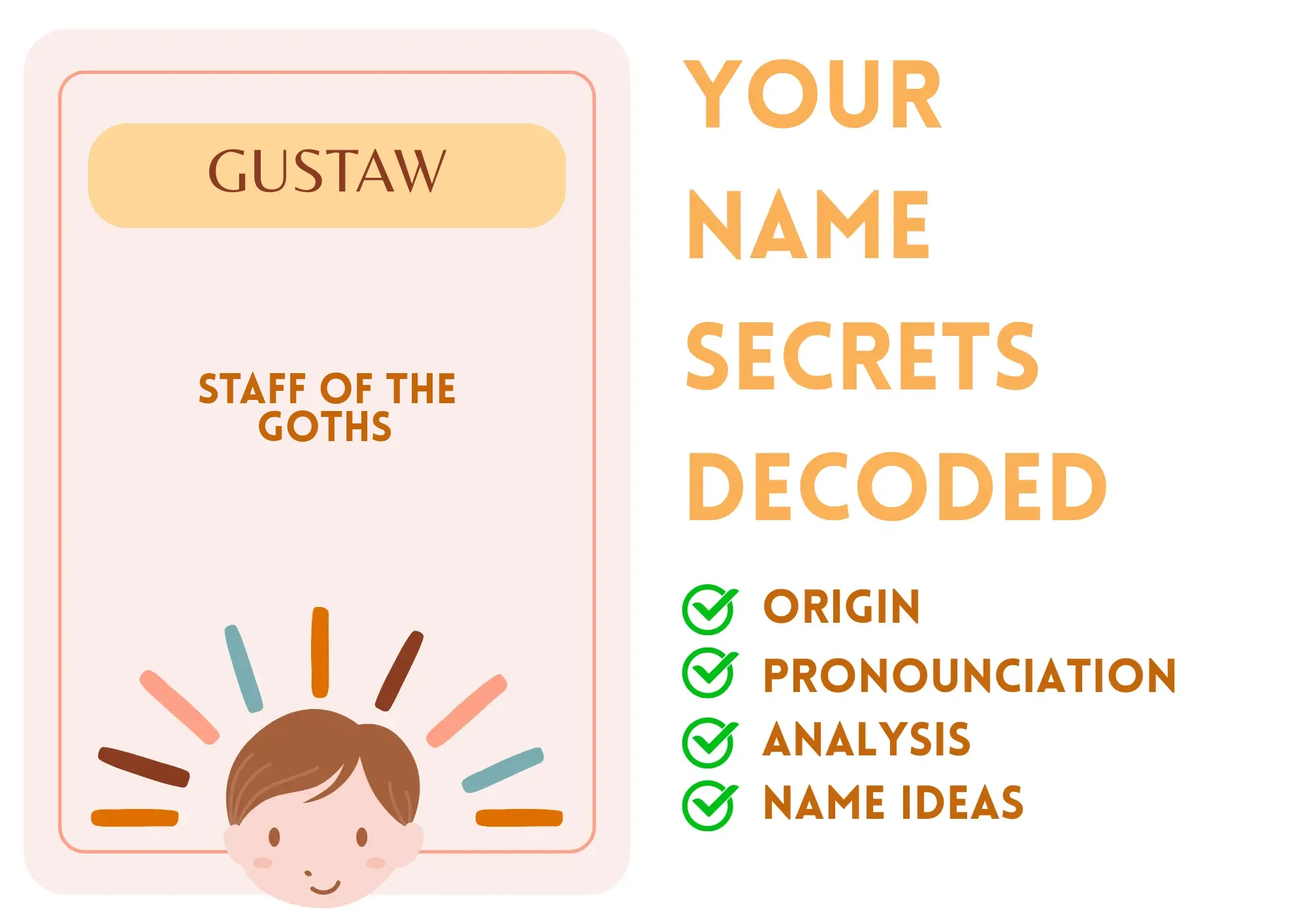
Gustaw
Gustaw is a name of Polish origin, derived from the Old Slavic elements meaning 'staff of the Goths.' It is often associated with strength and leadership, offering a noble and historical connotation. Gustaw is predominantly used as a masculine name and can be found in various cultures, primarily in Poland and other Slavic regions.
The name has a rich historical significance, being linked to figures in Polish history and culture, such as Gustaw Holoubek, a notable Polish actor.
In literature and popular culture, Gustaw also appears in works such as 'Dziady' (Forefathers' Eve) by Adam Mickiewicz. Overall, Gustaw resonates with a sense of tradition, strength, and a connection to cultural heritage.
Basic Information
Gender: Boy
Sounds Like: GOOS-tahf
Pronunciation Explanation: The first syllable is pronounced like 'goose' without the 'e', followed by a soft 'tahf'.
Summary and Meaning
Meaning: staff of the Goths
Origin: Gustaw has its roots in Polish and Slavic culture, deriving from historical language elements that denote strength and nobility.
Usage: Gustaw is traditionally a masculine name, firmly associated with male identity.
Name Number (Chaldean)
Name Number (Pythagorean)
Popularity (Global Rank)
Overall: 73690
Boys: 54235
Most Popular in
Religious and Cultural Significance
Religion: Christian
Background: As a name used in a predominantly Christian context, Gustaw carries traditional values associated with strength.
Cultural Significance: In Polish culture, Gustaw is often linked to historical and literary figures, embodying a sense of Polish pride and identity.
Historical Significance: The name Gustaw is historically significant in Poland, often referenced in literature and associated with notable figures, making it a part of the cultural narrative.
Popular Culture
Literature and Mythology: 'Gustaw' appears in Polish poems and plays, notably in Adam Mickiewicz's 'Dziady,' where it symbolizes deep cultural themes.
Movies and Television: The character Gustaw, especially associated with strong, leadership roles, can be found in various Polish films and TV shows.
Feelings and Perceptions
Perception: Gustaw is perceived positively among Polish speakers. It evokes a sense of heritage, strength, and tradition.
Positive Feelings: Classic, strong, noble, culturally rich.
Negative Feelings: Some may find it unfamiliar outside of Slavic cultures.
Practical Considerations
Ease of Writing and Calling: Gustaw is relatively easy to write and pronounce, consisting of six letters and two syllables, making it memorable and accessible.
Common Typos and Misspellings: Gustaf,Gustao,Gustow,Gustov
Common Nicknames: Gus,Gusti,Gusie
Gustaw Popularity
Gustaw Usage and Popularity By Country
| Country | Rank (Overall) |
|---|---|
| Poland | 532 |
| Seychelles | 1668 |
| Sweden | 12706 |
| Norway | 27537 |
| Germany | 31516 |
| Romania | 36646 |
| Australia | 51998 |
| Singapore | 53638 |
| United Kingdom | 64637 |
| Netherlands | 70785 |
Gustaw Usage and Popularity By City
| City | Rank (Overall) |
|---|---|
| Warsaw | 752 |
| Sydney | 24786 |
| Woodridge | 363 |
Compatibility Analysis
Famous Persons Named Gustaw
-
-
-
-
-
-
Gustaw Ostasz
Born: April 15, 1940 - Majdan Nepryski
polonist | literary scholar | literary historian
-
-
-
Gustaw Sajdok
Born: January 12, 1935 - Bystřice
opinion journalist | pedagogue | editing staff | translator | poet
-
Related Names
Similar Sounding Names:
Gustave,Gustav,Gustaf,Gustavo